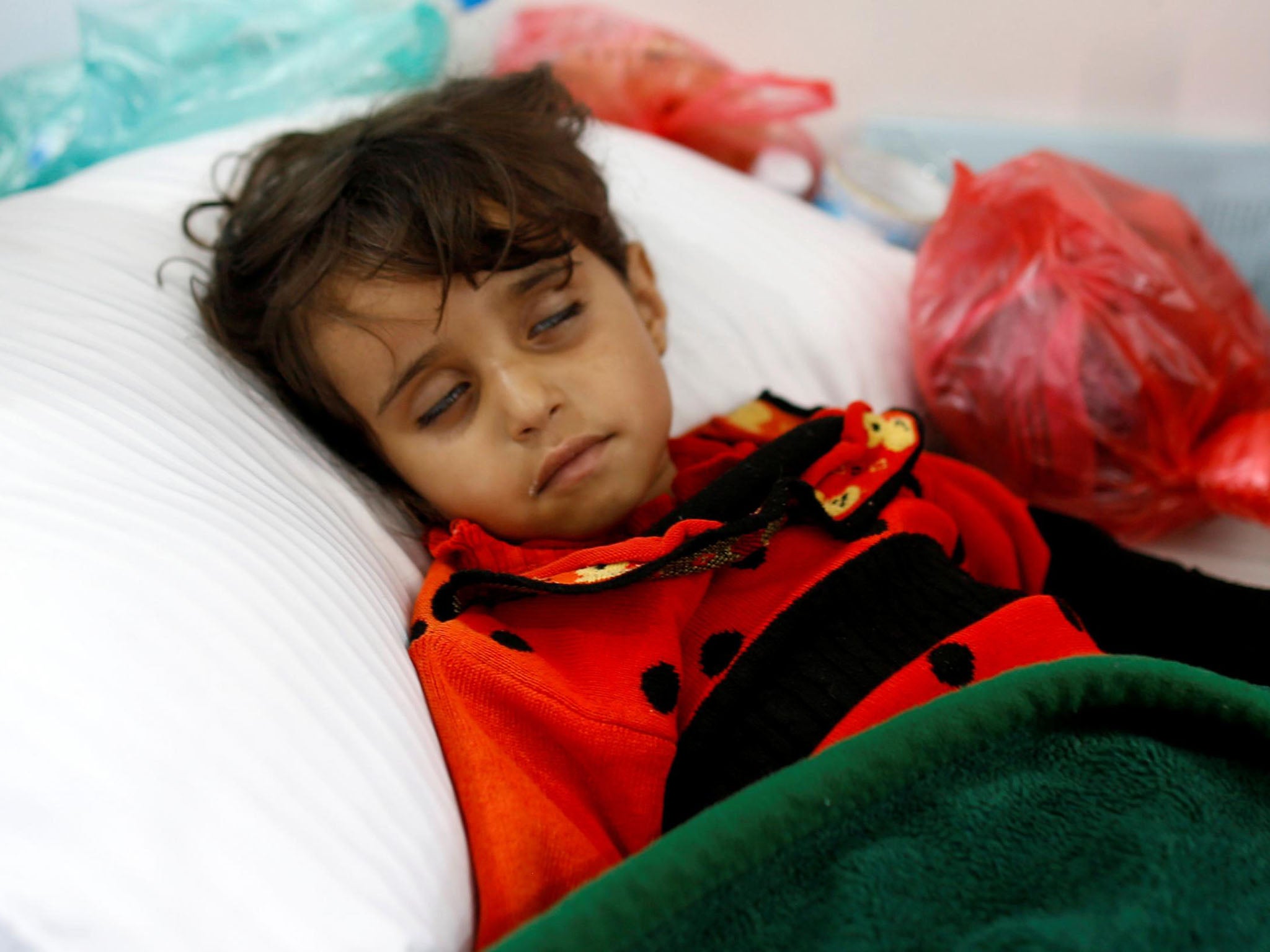Yemen: almost one death per hour as cholera epidemic spreads like wildfire
Number of suspected cases reaches 100,000 as Yemeni health system teeters on brink of collapse

A cholera epidemic is spreading like wildfire across war-ravaged Yemen, the World Health Organisation (WHO) has said, with a total of 100,000 suspected cases identified around the country.
A total of 798 deaths have now been attributed to the disease, which is affecting people in 19 of Yemen’s 22 provinces – equivalent to almost one death every hour since 27 April, Oxfam said, adding to the suffering of Yemen’s 27-million strong population.
Over the past two years, Saudi Arabia and its regional partners have used the spectre of Iran to justify an extensive bombing campaign on Yemen’s Shia Houthi rebels at the request of the exiled, internationally recognised Yemeni President Abdrabbuh Mansour Hadi.
The Saudi economic strangulation, blockades on Yemen’s air and seaports preventing the import of food and medicine and the targeting of vital infrastructure such as roads and bridges – and in some cases civilian buildings such as hospitals, and funeral gatherings – have contributed to the dire situation Yemenis are now facing.
Cholera – an acute diarrhoeal infection caused by ingestion of food or water contaminated with the bacterium Vibrio cholera – can kill the vulnerable, such as the very old, young and otherwise sick in hours if fluids are not replaced.
Children under the age of 15 account for 46 per cent of cases, WHO said.
“The cholera outbreak is making a bad situation for children drastically worse. Many of the children who have died from the disease were also acutely malnourished,” Dr Meritxell Relano, Unicef’s representative in Yemen, said in a statement.
The situation in Yemen
Show all 14“Today, life for children in Yemen is a desperate struggle for survival, with cholera, malnutrition and the relentless violence constantly sounding a death knell at their doorsteps,” she added.
While easily treatable and preventable with proper sanitation procedures, the country’s health, water and sanitation systems are on the verge of collapse.
Less than half of Yemen’s medical centres are still functional, 14.5 million don’t have regular access to clean water, and in several cases health and sanitation workers have not been paid in the past eight months.
In the past four weeks cases of cholera have broken out at a rate three times higher than when the outbreak was first confirmed in October 2016.
Houthis in charge of much of the country declared a state of emergency in the capital of Sanaa last month.
The UN estimates $2.1bn (£1.6bn) is needed to bring Yemen back from the brink of full-scale state failure, but donor governments only pledged half that amount at an aid conference in Geneva in April.
“Cholera is simple to treat and prevent but while the fighting continues the task is made doubly difficult. A massive aid effort is needed now,” Sajjad Mohammed Sajid, Oxfam’s Yemen country director said.
“Those backers of this war in Western and Middle Eastern capitals need to put pressure on parties to the fighting to agree a ceasefire to allow public health and aid workers to get on with the task.”
Western governments including the UK have been heavily criticised for selling weapons export licences to Saudi Arabia, which rights groups say are destined for use in Yemen’s war.
Officials within former US President Barack Obama’s administration worried the sales could amount to complicity in war crimes.
Drought, food insecurity and conflict have created conditions for cholera to thrive across both Yemen and East Africa, the International Rescue Committee said in a statement on Thursday.
In May alone cases of cholera almost doubled in Yemen and South Sudan, and more than 130,000 cases and 2,100 deaths in total have been confirmed across the two countries as well as Kenya, Ethiopia and Somalia.
Subscribe to Independent Premium to bookmark this article
Want to bookmark your favourite articles and stories to read or reference later? Start your Independent Premium subscription today.

Join our commenting forum
Join thought-provoking conversations, follow other Independent readers and see their replies